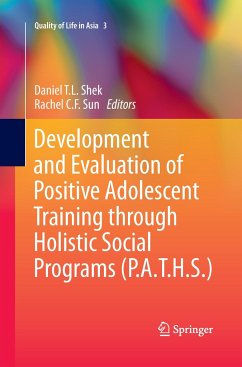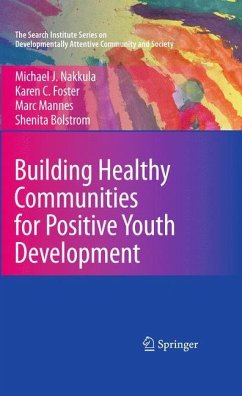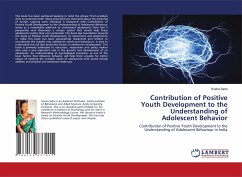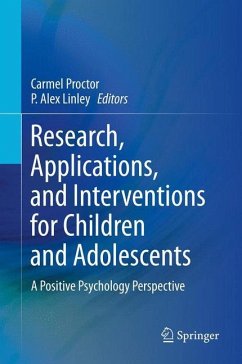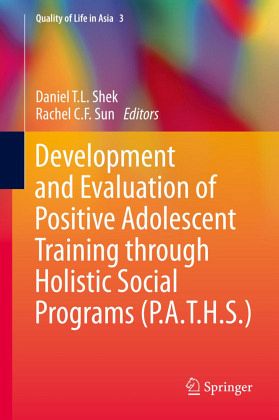
Development and Evaluation of Positive Adolescent Training through Holistic Social Programs (P.A.T.H.S.)

PAYBACK Punkte
38 °P sammeln!
This book outlines the development, implementation and evaluation of a project entitled "P.A.T.H.S. to Adulthood: A Jockey Club Youth Enhancement Scheme," with P.A.T.H.S. denoting Positive Adolescent Training through Holistic Social programmes.This pioneer project was conducted in Hong Kong between 2005 and 2012 with more than 210,000 participants. Its goal was to help students meet various challenges in their path to adulthood, with a focus on their psychosocial competencies, developmental assets and the promotion of healthy peer relationships. The project was initiated by The Hong Kong Jocke...
This book outlines the development, implementation and evaluation of a project entitled "P.A.T.H.S. to Adulthood: A Jockey Club Youth Enhancement Scheme," with P.A.T.H.S. denoting Positive Adolescent Training through Holistic Social programmes.
This pioneer project was conducted in Hong Kong between 2005 and 2012 with more than 210,000 participants. Its goal was to help students meet various challenges in their path to adulthood, with a focus on their psychosocial competencies, developmental assets and the promotion of healthy peer relationships. The project was initiated by The Hong Kong Jockey Club Charities Trust in collaboration with the Government's Social Welfare Department, Education Bureau and five universities in Hong Kong.
Edited by the researchers of the project, Development and Evaluation of Positive Adolescent Training through Holistic Social Programs explores the nature of positive youth development (PYD), the application of PYD constructs to youth programs and implementation issues.
Using multiple strategies, the book evaluates the overall effectiveness of the P.A.T.H.S. school-based programme and reveals that stakeholders had positive perceptions of the project, its implementers and benefits. Students in the program showed better positive development and displayed lower levels of substance abuse and delinquent behaviour than students in the control schools.
The book also details lessons learned, emergent issues, future directions as well as insights into the development of positive youth development programs particularly in Chinese communities. Development and Evaluation of Positive Adolescent Training through Holistic Social Programs will appeal to all educators, administrators, psychologists, social workers and allied profeesionals looking to promote whole-person development in their students, especially those with in interest in education in China.
This pioneer project was conducted in Hong Kong between 2005 and 2012 with more than 210,000 participants. Its goal was to help students meet various challenges in their path to adulthood, with a focus on their psychosocial competencies, developmental assets and the promotion of healthy peer relationships. The project was initiated by The Hong Kong Jockey Club Charities Trust in collaboration with the Government's Social Welfare Department, Education Bureau and five universities in Hong Kong.
Edited by the researchers of the project, Development and Evaluation of Positive Adolescent Training through Holistic Social Programs explores the nature of positive youth development (PYD), the application of PYD constructs to youth programs and implementation issues.
Using multiple strategies, the book evaluates the overall effectiveness of the P.A.T.H.S. school-based programme and reveals that stakeholders had positive perceptions of the project, its implementers and benefits. Students in the program showed better positive development and displayed lower levels of substance abuse and delinquent behaviour than students in the control schools.
The book also details lessons learned, emergent issues, future directions as well as insights into the development of positive youth development programs particularly in Chinese communities. Development and Evaluation of Positive Adolescent Training through Holistic Social Programs will appeal to all educators, administrators, psychologists, social workers and allied profeesionals looking to promote whole-person development in their students, especially those with in interest in education in China.




